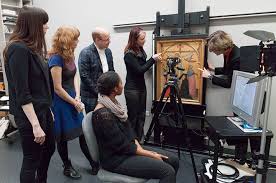Department Mission
The faculty of the Department of Art History studies art and visual culture in their many guises.
Our methods are nearly as wide-ranging and diverse as our objects of study, yet we share a horizontal approach to scholarship. We are alert to the ways in which artworks and other artifacts are tied to near and distant cultures and locations by relations of exchange, encounter, coalition, competition, domination, performance, religion, ritual or resistance.
We conduct research and train graduate and undergraduate students from a global perspective in the fields of Modern and Contemporary, African American and African Diaspora, Early Modern, Asian, Ancient Mediterranean, and Medieval art history. Our Department's comparative and cross-disciplinary orientation has contributed to the breadth and integrity of our curriculum and resulted in additional areas of strength:
- African and African Diaspora Studies
- Built environments and spatial theory
- Colonial and postcolonial studies
- Critical theory
- Environmental studies and ecocriticism
- Gender and sexuality studies
- Materiality and materialisms
- Science, technology, and the circulation of knowledge
- Theories of cultural exchange
These areas of focus place our program at the forefront of current debates within art history: our research and teaching are informed by critical approaches from across the humanities that put pressure on the historical presuppositions of the discipline in order to chart new areas of scholarly inquiry. At the same time, we remain committed to intensive archival research, object-based study, and rigorous methodological engagement. It is our belief that the careful scrutiny of forms, objects, and practices is not only integral to the historical analysis of particular cultural imaginaries, but also offers vital lessons for students at all levels about the reigning logics of visual production in the present and means of critiquing them.
